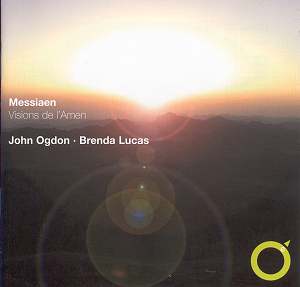This is my first peek
at the brand new Explore label, and
I can say that their presentation is
as attractive as their catalogue so
far. It might be argued that some element
of the original LP sleeves might have
served better than the variety of photographic
material used for the booklet covers,
but the overall ‘look’ brings some classic
recordings and performances from the
last century and dumps them firmly in
the lap of this. They demand attention,
and deserve it.
This recording was
first released on Argo in 1971, and
was one of the first recordings of Messiaen’s
great cycle of pieces for two pianos.
Somewhat amazingly, this is its first
international CD release. John Ogdon
was an acclaimed interpreter of Messiaen,
having already recorded the Vingt
Regards for Decca in the same studio
in 1969, and of course his duo with
Brenda Lucas knew international renown.
Having already ditched my copy of the
surprisingly naff Erato recording by
the Labècque sisters my reference
is the excellent recording on Unicorn
as the final part of Peter Hill’s complete
Messiaen set, companioned by Benjamin
Frith.
Starting with the sound
quality, this 1970 recording does inevitably
have a little tape hiss – something
I am always reassured by, showing that
the treble hasn’t been filtered out
of existence. The studio acoustic is
also rather dry, but with Hill and Frith
able to revel in St. George’s, Brandon
Hill as well as the wonders of digital
technology I shouldn’t really be comparing
chalk with cheese – if you are interested
in this disc it will be for the performance
rather than blistering modern sound.
In fact, this recording wears its years
like a silk cravat, a little old-fashioned,
but still very distinguished. Separation
between the two pianos is good, without
being too wide, and the ensemble between
the players blends as one where you
would hope and expect.
Visions de l’Amen
is one of those elusive works which
requires not only superb technical control
and a seamless, symbiotic pairing between
the players, but also that Catholic
sense of mystery and awe with everything
between heaven and earth. Where it counts
most, Ogdon and Lucas are right up there,
transporting us, as the music dictates,
to regions beyond. From the opening
Amen de la Création the
low chords which build in a massive
chorale are the vastness of space or
the solidity of granite, depending on
how you set your jaw – clenched in suspense,
or open with awe. The duo pulls no punches
with the brutal nature of Amen des
étoiles, de la planète
à l’anneau, and the heartrending
drama of the Amen de l’Agonie de
Jésus is fully exploited.
The central Amen du Désir
is most moving – gentle ecstasy
subdued by the energetic passions of
love, and with 2:30 of coda which should
be mounted and on exhibition in the
Louvre.
Comparing Ogdon/Lucas
and Hill/Frith, I get the sensation
that the work is more settled, more
thoroughly digested by the more recent
pairing. The grand scale is all there,
and all of the atmosphere and drama.
With every note weighed and thought
through Hill and Frith loose a little
of the sense of wonder which Ogdon and
Lucas seem to create. It’s hard to define,
and I do love the Unicorn CD, but take
almost any moment and the beauty is
in the playing, rather than in the music.
In some indefinable way Ogdon and Lucas,
even despite some moments of slightly
dodgy ensemble, convey Messiaen’s mystic
message more effectively. They certainly
sound more French, which is perhaps
the secret. The ghosts of Berlioz, Dukas,
Debussy, Ravel and Satie sit on Messiaen’s
shoulder in the final Amen de la
Consommation, and they were all
crowded into that studio on New Year’s
Eve 1970, joyously turning the pages
for John Ogdon and Brenda Lucas.
Dominy Clements
The
EXPLORE Catalogue


